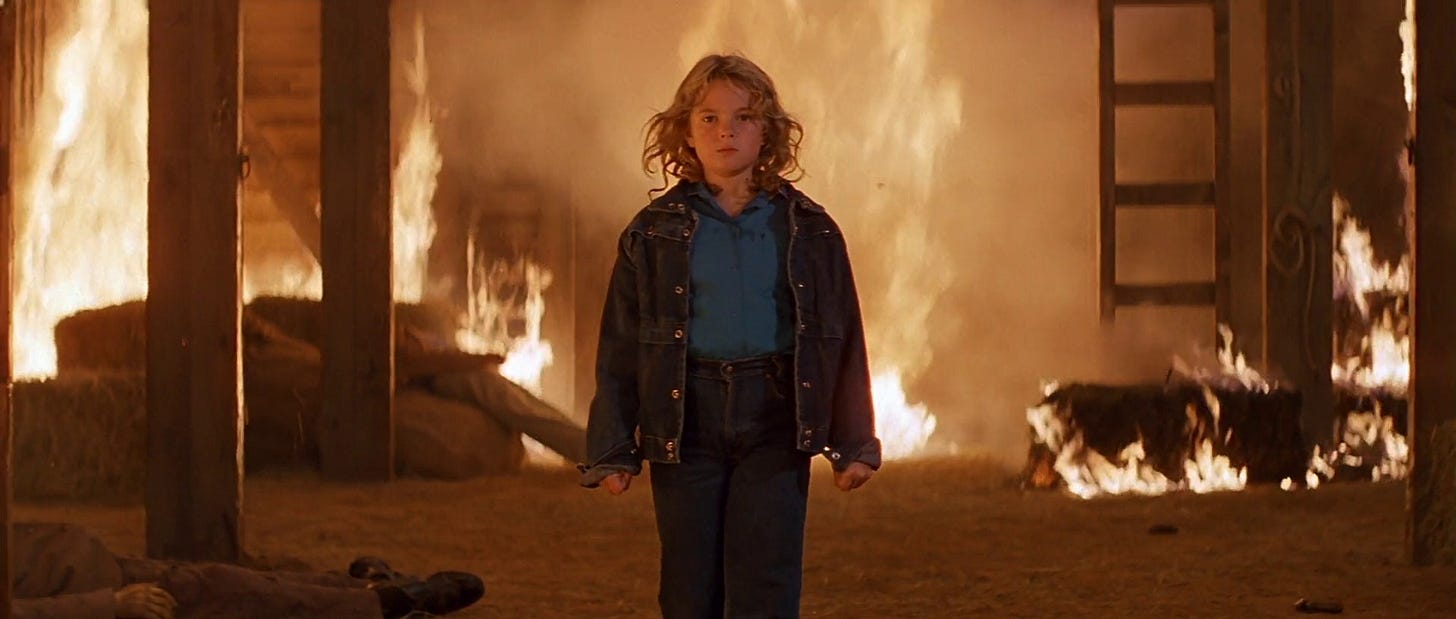Firestarter 1984 Is a Surreal Superhero Film
A slooow, weird movie.
I read the 1980 Stephen King novel Firestarter decades back, but had never seen the 1984 Drew Barrymore film. So I finally watched it. And it is one of the all time weirdest superhero movies ever dropped onto the big screen with a psychedelic Tangerine Dream soundtrack and George C. Scott as a giant slice of ham.
“Now wait a minute,” you’re probably saying. “Firestarter is not a superhero film. It’s a horror film. Did you miss the part in the last paragraph where you said it was based on a Stephen King novel?”
And yes, I know it’s generally thought of as a horror film. But consider; it’s all about a traumatized little girl who discovers she’s got superpowers and uses them to destroy a bunch of bad guys. How is that not a superhero narrative? She’s even bullet proof. Yes, she doesn’t have a supersuit, but neither does Jessica Jones. Work with me, here.
Maybe you’re not convinced. But either way, the genre uncertainty is a big part of why the film is so strange. For much of its length it hovers paralyzed between different narrative tropes, waiting half-tranced to catch fire.
The film starts in media res, as Andy McGee (David Keith) and his daughter Charlie (Barrymore) flee from a mysterious government organization called the Shop, which killed Charlie’s mother. The backstory is sketched in shortly thereafter; Andy and his wife Vicky (Heather Locklear) were the subjects of a government experiment which gave them psychic powers. Vicky’s abilities are uncertain, but Andy can push people to obey his mental commands, and their daughter, Charlie, has extreme pyrokinesis—she can set anything on fire. The Shop under the command of Captain Hollister (Martin Sheen) wants to bring her in to control her.
Superhero stories these days generally start with an origin story and then escalate through various revelations about the big bad before a cathartic battle and victory at the end. Horror stories in contrast begin with a semi-stable status quo and then tip over into apocalypse.
Caught between these two roads leading in different directions, Firestarter wanders rather aimlessly back and forth between them, the plot meandering from placid corn to FX extravaganza. Andy and Charlie escape to rural retreats before being captured and brought to the compound of the Shop. There Charlie is tested and subjected to an elaborate plot involving an assassin, John (Scott), who dresses up as a janitor to win her trust.
There aren’t really any plot twists—everything’s telegraphed beforehand—and Charlie doesn’t get more powerful in any linear way. Instead she makes resolutions not to use her power and then changes her mind and burns things up again. As a result the story feels less like a race towards an inevitable end and more like a neurotic dream, where you keep losing and finding the same plot points over and over again.
While you’re wandering around in that dream, you also search glacially for violent super effects. Force blasts these days zip across the screen at the speed of CGI. But Firestarter is from a slower, simpler era and Charlie’s fire powers seeks out its living and unliving victims with glacial speed. First there’s a close up on her face, then her hair starts billowing, then there’s a long shot of whatever target she’s targeting, and finally said target bursts into flame, or explodes, or a fireball streaks towards it. Action sequences aren’t so much sequences as disconnected panorama. You get an abstracted idea of carnage.
Charlie’s powers feel like they’re cut off from Charlie herself—they float off somewhere nearby, burning her enemies without necessarily making her their destroyer. It’s sort of an empowerment fantasy about getting revenge on the people who tormented your family, and it’s sort of a horror movie about transgressors who commit evil and then are sent to hell by fate and eldritch forces. But it’s also just a spectacle of flickering imagery, staged for its own sake, without any real anchor in cause and effect.
I wouldn’t say that Firestarter is a great movie. The acting is indifferent and it’s one of King’s weaker plots. But at a time cinema movie screens are saturated with formulaic superheroing, it is intriguing to go back and watch a movie that so obviously didn’t get the memo about where superheroes are supposed to go, and how quickly. I suspect the 2022 reboot will try to speed things up and give Charlie’s fire a bit more fiery snap. If it does, though, it may lose the core of the original, a story about a girl frozen by, or near, her own power.


